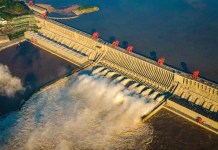Kabul, a city of some 6 million, is now one of the most polluted cities in the world, ranking in the top of the list among other polluted capitals like New Delhi, Dhaka or Beijing.
Environmental issues in Afghanistan predate the political turmoil of the past few decades. Forests and wetlands have been depleted by centuries of grazing and farming, practices which have only increased with modern population growth.
The urban population has swelled in the past several years. Since 2002, over 5 million former refugees living in Iran have returned home to Afghanistan. Many of them settled in the capital Kabul, which also includes migrants that have come from drought-ravaged rural areas.
Air pollution constitutes a major problem in Afghanistan. The country’s reliance on inexpensive energy has created major issues. Most vehicles run on diesel fuel, and household energy often relies on burning wood and other materials. As a result, air pollution in urban areas is visible and may pose health issues.
A layer of thick smog and smoke continues to wrap Afghanistan’s capital every day. Old vehicles and electrical generator using poor quality fuels pump toxins into the air. Coal, garbage, plastic and rubber are burned by poor people at home, brick kilns, public baths and bakeries. Many apartment buildings have no proper sanitation system, and garbage is piled on roadsides and sidewalks.
China wins the Air Pollution Battle while India Continues to Choke
The suffering victims majorly including children and elderly continue to experience the misery due to the poisoned air as people in the war-stricken areas burn whatever they can to keep warm in Kabul’s winters, with frequent sub-zero temperatures and snow.
At least 19,400 of the 2017 deaths are a result of household pollution. According to the State of Global Air survey, air pollution contributes to a loss of around two and a half years of life expectancy at birth.
Decades of war has aggravated the damage to Afghanistan’s environment and have made it a battle. Environmental issues are far down the list of priorities for a government struggling with basic rights such as security issues, rampant corruption and a sinking economy.
Ezatullah Sediqi, deputy director for the National Environmental Protection Agency, mentioned “Three or four decades ago, it was a wish for people to come to Kabul and breath this air. But in the wars since, we lost our entire urban infrastructure for water, electricity, public transportation, green areas, and all these things.”
However, Kabul’s environmental department has launched a new program to control old vehicles, one significant source of pollution. Mohammad Kazim Humayoun, the department’s director said: “Fighting pollution is important as fighting terrorism.”
The Kabul municipality has appealed to the residents to stop burning garbage and instead use fuel in the freezing winters. The government has launched an environmental awareness campaign. Ads on TV, programs at schools and universities and sermons in mosques talk about pollution’s harm to society and tell listeners about steps to reduce it.
Chinese-Funded Water Project To Help Ease Water Shortage in Balochistan
To increase the hardship, the fuel is either too expensive or not available for many in Kabul. Electrical heaters are too pricey for most, and power outages are frequent.
Doctors at Kabul’s Indira Gandhi Children’s Hospital mention that they’ve seen the numbers of patients with pollution-related illnesses increase. In the winter, hundreds of children a day sometimes come in, suffering from respiratory illnesses, according to hospital officials.
Dr. Saifullah Abassin, a specialist trainer at the hospital, said his ward has a capacity of 10 patients but often has three times that number.
Sediqi, a member of the NEPA, stated “ever since the first post-Taliban government in 2001, there was no planning on urban infrastructure, which left individuals to build on their own. Unfortunately, that led to unplanned development. So now we have numerous urban problems and challenges and organizational challenges, which is causing environmental pollution.”
With the city fighting its battle, the authority needs to take initiatives like encouraging the planting of trees and creating green spaces, as well as implementing a city master plan to stop unplanned development around the capital, often a source of pollution because of their lack of services.
With Inputs From Associated Press. Edited By EurAsian Times




